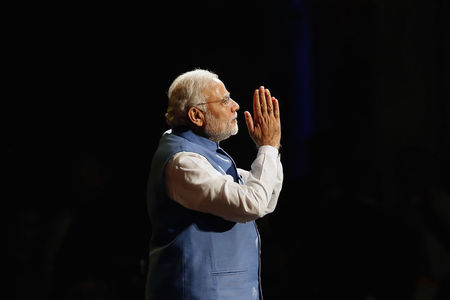By Frank Jack Daniel
KATHMANDU (Reuters) - Visiting Nepal for a South Asia summit, Indian Prime Minister Narendra Modi has dropped plans to hold rallies at the birthplaces of the Buddha and a Hindu goddess, after controversy over whether he was gaining too much prominence inside Nepal.
Suspicion of India is common among South Asia's smaller nations, and the sensitivies shown in Nepal would be a small reminder for Modi as he seeks to show leadership in a region scarred by ethnic and religious divides.
Modi earned some goodwill in May by inviting the region's leaders, including arch-rival Pakistan, to his inauguration.
He will be hoping to follow up on that success during the two-day summit of the South Asian Association for Regional Cooperation (SAARC) in Kathmandu that starts on Wednesday.
SAARC summits bring together leaders from Afghanistan, Bangladesh, Bhutan, India, the Maldives, Nepal, Pakistan and Sri Lanka. Power integration is high on the agenda for the eight countries.
Modi had planned visits to Lumbini, the birthplace of the Buddha, and Janakpur, the birthplace of Sita, the heroine of the Hindu epic the Ramayana. But in the past weeks, Nepal's political parties argued over whether his rallies would draw large crowds and amount to interference in domestic politics.
On Sunday, he formally dropped visits outside Kathmandu from his plans, citing scheduling issues. Nepal's government blamed security concerns for the controversy.
"The government wanted to have the civic reception in a smaller place because controlling the crowd in a bigger ground could be a problem," Prakash Adhikari, press advisor to Nepal's Prime Minister Sushil Koirala, told Reuters on Tuesday.
PAKISTAN TENSIONS
As at past summits, a focus of attention will be on whether the leaders of India and Pakistan take the opportunity for talks to reduce tensions between their nuclear-armed states.
India's Foreign Minister Sushma Swaraj on Monday refused to rule out a meeting between Modi and Pakistan's Prime Minister Nawaz Sharif. Both were due to arrive in Kathmandu on Tuesday.
After the initial overtures to Sharif, relations between India and Pakistan have again been punctuated by exchanges of fire on the border in disputed Kashmir. Last month 20 people were killed in the shelling.
"This is the moment for India to lead, by crafting a future for SAARC that is not held back by India-Pakistan tensions," India's Hindustan Times said in a leader on Tuesday.
During his first six months in power, Modi has scored a series of successes, including repairing battered ties with Washington, but relations are proving more tricky closer to home, where an assertive China has made inroads in recent years.

The summit will see a discussion led by some Nepalese lobbyists about giving China a bigger role in the SAARC group than its current observer status.
(Addditional reporting by Gopal Sharma; Editing by Simon Cameron-Moore)